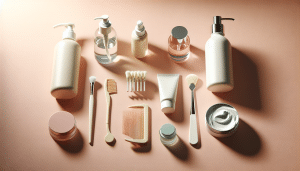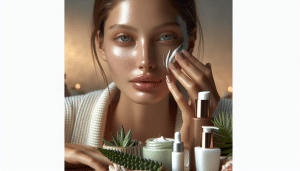Why Your Skin Barrier Matters More Than You Realize
Natalie Brooks September 9, 2025
Curious about why skincare routines sometimes fail? Discover how the skin barrier impacts hydration, sensitivity, and your glow. Explore the essentials of skin barrier care, including protective routines and expert-approved tips, so your skin feels healthier and more resilient.
Understanding the Skin Barrier: The Hidden Guardian
The skin barrier is often overlooked, yet it holds a crucial role in wellness and beauty routines. Made up of lipids and cells, the barrier acts like a shield, protecting what lies beneath from environmental stressors, pollutants, and harmful microbes. When this barrier is balanced, the skin feels plump, hydrated, and less prone to irritation. Many wellness experts now prioritize barrier health in modern skincare approaches for long-term radiance and comfort.
What exactly happens when this barrier is compromised? Water evaporates more quickly from the skin, leading to dryness and flakiness, while harmful external particles gain easier entry. This heightened sensitivity often triggers redness, itching, and inflammation. By understanding the function of the skin barrier and recognizing the warning signs of damage, individuals can make more informed choices regarding their skincare rituals and product selection (Source: https://www.aad.org/public/everyday-care/skin-care-basics/dry/skin-barrier).
The importance of the skin barrier in beauty wellness is further underscored by research into chronic skin conditions such as eczema or rosacea. These often stem from weakened skin defense, showing just how foundational a healthy barrier can be. Restoring and protecting this layer has become a guiding principle for those seeking both short-term hydration and lasting skin vitality.
Why Moisture Retention Is Key For Glowing Skin
One of the skin barrier’s superpowers is in regulating moisture. Transepidermal water loss is the technical term used when skin loses valuable hydration, typically through a weakened barrier. Moisturizers containing ceramides and hyaluronic acid are recommended ingredients for promoting lasting hydration. This approach doesn’t just soothe dryness—it helps the skin appear fuller and more luminous, supporting wellness goals inside and out (Source: https://www.ncbi.nlm.nih.gov/pmc/articles/PMC7319989/).
Proper moisture retention allows skin to withstand external stress while locking in vital nutrients. People with naturally dry or sensitive skin especially notice faster improvement when their routines focus on rebuilding the lipid layer. Consistent use of barrier-friendly creams and serums not only delivers immediate comfort but helps rebuild the skin’s defenses for future resilience.
Many individuals are surprised to learn that environmental factors such as cold weather, pollution, or even harsh air conditioning can sap skin’s hydration just as much as skipping moisturizer. The key to wellness here lies in adopting gentle habits: using lukewarm water, patting skin dry, and applying serums while the face is still slightly damp. Simple changes like these can make a world of difference in your daily glow.
Common Threats to Your Skin Barrier Health
Everyday habits, even well-meaning ones, can stress the skin’s barrier. Over-cleansing, using harsh exfoliants, or applying high concentrations of active ingredients without professional guidance can gradually erode the protective layer. These actions strip away natural oils, making the skin more susceptible to redness and flare-ups. Being aware of these triggers is the first step in keeping the skin barrier strong (Source: https://www.health.harvard.edu/blog/protecting-the-barrier-that-protects-your-skin-2020072820790).
Other hidden culprits include environmental pollution and changes in temperature. Tiny airborne particles not only irritate the skin but can penetrate deeper layers when the barrier is weak. Similarly, moving between indoor and outdoor environments exposes the skin to rapid changes, putting additional stress on this essential structure. Recognizing these risks allows wellness-focused individuals to modify their routines accordingly.
Stress—both physical and emotional—can also impact barrier function. Exposure to UV rays or chronic emotional stress is linked to increased skin sensitivity and dryness. Protective habits such as wearing a broad-spectrum sunscreen, adopting meditation, or practicing mindfulness can provide indirect support by promoting holistic well-being alongside topical care.
Building an Effective Barrier Care Routine
Designing a routine that prioritizes barrier care means starting with gentle, sulfate-free cleansers and products rich in nourishing lipids. Look for key ingredients such as ceramides, fatty acids, and cholesterol. These agents mimic components naturally found in the skin’s outermost layers and are proven to help restore balance. Wellness experts often recommend layering lightweight hydration before sealing it in with occlusive creams (Source: https://www.ncbi.nlm.nih.gov/pmc/articles/PMC6791091/).
Adjust the use of exfoliants based on skin’s condition. While gentle chemical exfoliation can encourage renewal, overdoing it may compromise barrier health. A mindful approach includes patch testing new products, using physical exfoliants sparingly, and spacing out treatments to allow for recovery. Simple swaps like using soft washcloths or switching abrasive scrubs for enzyme-based cleansers benefit long-term skin comfort.
Nighttime routines offer an ideal opportunity for deep nourishment. Skin repairs itself overnight, and layering on a rich moisturizer or an overnight mask supports this natural restoration process. Humidifiers in the bedroom environment can also help boost hydration, making sure the skin barrier stays robust and well-supported throughout sleep.
The Role of Diet and Lifestyle in Barrier Strength
A holistic view of skin wellness recognizes that diet, hydration, and rest affect barrier resilience. Omega-3 fatty acids—found in foods like salmon, flaxseeds, and walnuts—nourish the skin from the inside out, supporting lipid production and natural glow. Adequate water intake plays a crucial role in flushing toxins and bringing oxygen to skin cells, helping them function optimally (Source: https://www.hsph.harvard.edu/nutritionsource/omega-3-fats/).
Insufficient sleep or high stress can slow down the body’s repair processes, leaving the barrier vulnerable to microtears or inflammation. Establishing consistent sleep habits, paired with daily mindfulness practices, brings benefits not just for the skin but overall well-being. Integrating nutrient-dense foods rich in antioxidants may further shield the skin from oxidative damage and environmental challenges.
People also notice improved skin texture and resilience when they avoid excessive alcohol, smoking, or highly processed foods. These elements often strip beneficial nutrients from the body and can show up as dullness or heightened sensitivity. Supporting whole-body wellness is ultimately reflected in long-term barrier health and a confident, radiant appearance.
Expert-Backed Tips To Restore and Maintain Barrier Health
Leading dermatologists suggest prioritizing routine simplicity. Fewer, high-quality products deliver better results for most people. Fragrance-free and alcohol-free formulations pose less risk of irritation, making them a safe starting point for barrier recovery. Those unsure how to revamp their routines can seek out consultations with board-certified professionals for personalized recommendations (Source: https://www.derm.umn.edu/skin-stories/skin-barrier-health).
Regular skin checks are invaluable for tracking changes and catching problems early. If the skin suddenly feels tight, itchy, or develops persistent red patches, these might be early warning signs of a weakened barrier. Consider documenting what products are being used whenever changes occur, as this can help pinpoint potential sources of irritation or imbalance, improving future care strategies.
Finally, remember that sunscreen is a powerful ally in maintaining barrier integrity. UV rays are a known contributor to barrier breakdown and premature aging. Look for broad-spectrum SPF 30 or higher and reapply if exposed to sunlight for extended periods. Sun protection, when combined with gentle care and internal support, creates a powerful foundation for vibrant, healthy-looking skin.
References
1. American Academy of Dermatology Association. (n.d.). Skin barrier: What is it, and how do you protect it? Retrieved from https://www.aad.org/public/everyday-care/skin-care-basics/dry/skin-barrier
2. Rawlings, A.V., & Harding, C.R. (2020). Moisturization and skin barrier function. International Journal of Cosmetic Science, 42(6), 529-538. Retrieved from https://www.ncbi.nlm.nih.gov/pmc/articles/PMC7319989/
3. Harvard Health Publishing. (2020). Protecting the barrier that protects your skin. Retrieved from https://www.health.harvard.edu/blog/protecting-the-barrier-that-protects-your-skin-2020072820790
4. Elias, P.M., & Williams, M.L. (2019). Re-appraisal of the role of lipids in the skin barrier. International Journal of Molecular Sciences, 20(21), 5549. Retrieved from https://www.ncbi.nlm.nih.gov/pmc/articles/PMC6791091/
5. Harvard T.H. Chan School of Public Health. (n.d.). Omega-3 Fatty Acids: An essential contribution. Retrieved from https://www.hsph.harvard.edu/nutritionsource/omega-3-fats/
6. University of Minnesota Department of Dermatology. (n.d.). Skin barrier health. Retrieved from https://www.derm.umn.edu/skin-stories/skin-barrier-health








